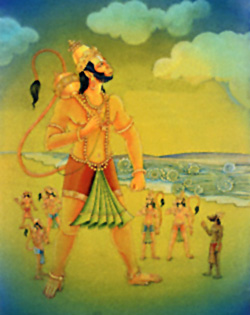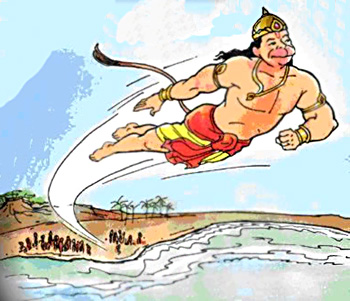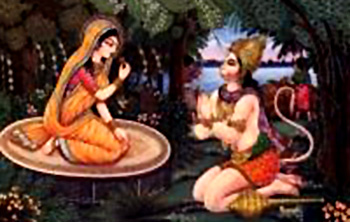 Sita in Lanka was kept under tight security of the rakshasis of the demon king Ravana at Ashoka Vatika. Ravana always persuaded her to be his queen but Sita warned her of his death at the hands of Rama. Here, Rama gave his signet-ring to Hanuman to show for a sign to Sita when he should discover her. The monkeys of Sugriva who went to the southern direction searched all the jungles and caves and hidden places, and lastly they came to the mighty ocean, the home of Varuna, covered with dreadful waves. There they got to know from Sampati, a vulture and also the brother of Jatayu that Ravana lives in Lanka, he took Sita away to his kingdom, and Lanka was hundred leagues away from the shore. The monkeys thus became hopeful that Sita was in Lanka but when they marched down to the shore and sat beside the heaving sea they were again downcast, and took counsel very sadly with each other. One of the monkeys told that he could bound over twenty leagues, and another fifty, and one eighty, and one ninety, while Angada, son of Vali, could cross over a hundred, but he would not be able to return.
Sita in Lanka was kept under tight security of the rakshasis of the demon king Ravana at Ashoka Vatika. Ravana always persuaded her to be his queen but Sita warned her of his death at the hands of Rama. Here, Rama gave his signet-ring to Hanuman to show for a sign to Sita when he should discover her. The monkeys of Sugriva who went to the southern direction searched all the jungles and caves and hidden places, and lastly they came to the mighty ocean, the home of Varuna, covered with dreadful waves. There they got to know from Sampati, a vulture and also the brother of Jatayu that Ravana lives in Lanka, he took Sita away to his kingdom, and Lanka was hundred leagues away from the shore. The monkeys thus became hopeful that Sita was in Lanka but when they marched down to the shore and sat beside the heaving sea they were again downcast, and took counsel very sadly with each other. One of the monkeys told that he could bound over twenty leagues, and another fifty, and one eighty, and one ninety, while Angada, son of Vali, could cross over a hundred, but he would not be able to return.
Jambavan reminds Hanuman of his power
While the monkeys were thus discussing with each other, Jambavan, a noble bear, addressed Hanuman, and reminded him of his origin and birth, how the wind-god had begotten him and his mother Anjana had borne him in the mountains, and when he was still a child he presumed the sun to be a fruit growing in the sky, and sprang easily three thousand leagues toward it. He also reminded him of how Indra had cast a bolt at him, breaking his jaw and how the wind-god in anger began to destroy the heavens and earth, till Lord Brahma pacified him and accorded him the boon that his son should be invulnerable, and Indra gave him the boon of choosing his own death. Hanuman, thus reminded of his prowess roused himself, and the monkey host rejoiced. Swelling with pride and might, he boasted of the deed he would accomplish. Then he rushed up the mountain Mahendra, shaking it in his wrath and scaring every beast that lived in its forests and caves. With the purpose of achieving a hard task, where no friend could help and no foe hindered, Hanuman stood with head uplifted like a bull and praying to the sun, to the mountain wind, to the Self-create and to all beings; he set his heart in the work to be accomplished.
Hanuman crosses the ocean and reaches Lanka
 Hanuman, after reminded of his power by Jambavan, grew great, and stood, like a fire, with bristling hair, and roared like thunder, brandishing his tail. He gathered energy of mind and body and determined to find out Sita. He thus sprang up so that the very trees were dragged upward and fell back again behind him. He hurtled through the air like a mountain, his lifted tail like Sakra`s banner. So Hanuman flew over the ocean. When the friendly ocean lifted up Mainaka Mount, full of roots and fruits, for Hanuman to take rest, Hanuman rose up and coursed through the air like Garuda himself. Then Sinhika, rakshasi by birth, rose from the sea and caught him by the shadow, and would devour him, but Hanuman dashed into her mouth and, grew great, burst away again, leaving her dead and broken. While he perceived the farther shore, thinking his huge not suitable for a secret mission, he resumed his natural shape and size, and so alighted on the shore of Lanka, or was he ever so little wearied or fatigued.
Hanuman, after reminded of his power by Jambavan, grew great, and stood, like a fire, with bristling hair, and roared like thunder, brandishing his tail. He gathered energy of mind and body and determined to find out Sita. He thus sprang up so that the very trees were dragged upward and fell back again behind him. He hurtled through the air like a mountain, his lifted tail like Sakra`s banner. So Hanuman flew over the ocean. When the friendly ocean lifted up Mainaka Mount, full of roots and fruits, for Hanuman to take rest, Hanuman rose up and coursed through the air like Garuda himself. Then Sinhika, rakshasi by birth, rose from the sea and caught him by the shadow, and would devour him, but Hanuman dashed into her mouth and, grew great, burst away again, leaving her dead and broken. While he perceived the farther shore, thinking his huge not suitable for a secret mission, he resumed his natural shape and size, and so alighted on the shore of Lanka, or was he ever so little wearied or fatigued.
Hanuman from the mountain summit beheld the city of Lanka, girt with a golden wall, and filled with huge buildings as cloudy mountains, the masterpieces of Lord Vishwakarma. He waited for sunset; then, diminishing him to the size of a cat, he entered Lanka at night, unseen by the guards. Lanka seemed to him like a woman, having for robe the sea, for jewels cow-pens and stables, her breasts the towers upon her walls. As he entered in, she met him in a dreadful shape and barred his way. Then Hanuman struck her down, though gently, regarding her a woman, and she yielded to him, and bade him carry out his affair.
Hanuman enters the Palace of Ravana in Lanka
Hanuman made his way to the palace of Ravana, towering on the mountain-top, girt with a wall and moat. By that time the moon was full and high, sailing like a swan across the sky, and Hanuman laid eyes on the dwellers in the palace, some drinking, some engaged in amorous dalliance, some glad and some sorry, some eating, some drinking, some making music, and some sleeping. Several fair brides lay there in their husband`s arms, but Sita of peerless virtue could not be found and thus Hanuman was disappointed. Then he sprang from court to court, visiting the quarters of all the foremost rakshasas, till at last he came to the apartments of Ravana, a very mine of gold and jewels, ablaze with silver light.
He sought for Sita every where and left no corner unexplored; golden stairs and painted cars and crystal windows and secret chambers set with gems, all these he searched, but could not find Sita. The odour of drink and meat he sniffed, and following the air he went to the sleeping place of Ravana. There lay the lord of the rakshasas upon a glorious bed, asleep and breathing heavily; huge was his frame, decked with splendid jewels, like a crimson sunset cloud pierced by flashes of lightning; his big hands lay on the white cloth like terrible five-hooded serpents; four golden lamps on pillars lit his bed. Around him lay his wives, fair as the moon, decked in glorious gems and garlands that never faded. Some, wearied with pleasure, slept where they sat; one clasped her lute like an amorous girl embracing her lover; another fair one, skilled in the dance, made graceful gestures even in her sleep; others embraced each other. There he also found Mandodari, Ravana`s queen, exceeding all others in her splendour and loveliness, and Hanuman guessed she must be Sita, and the thought enlivened him, so that he waved his arms and frisked his tail and sang and danced and climbed the golden pillars and sprang down again, as his monkey-nature moved him.
 But reflection showed his error, as Hanuman thought that without Rama, Sita would not eat or drink or sleep or decorate her person, nor would she company with any other than Rama and thus he was made sure that the lady whom he thought to be Sita was someone else. So Hanuman ranged farther through the palace, looking for many a bower in vain. Many fair ones he looked at, but never found Sita, and he deemed she must be slain or eaten by the rakshasas. So he left the palace and sat awhile in deep dejection on the city wall.
But reflection showed his error, as Hanuman thought that without Rama, Sita would not eat or drink or sleep or decorate her person, nor would she company with any other than Rama and thus he was made sure that the lady whom he thought to be Sita was someone else. So Hanuman ranged farther through the palace, looking for many a bower in vain. Many fair ones he looked at, but never found Sita, and he deemed she must be slain or eaten by the rakshasas. So he left the palace and sat awhile in deep dejection on the city wall.
Hanuman finds Sita
At last, Hanuman ranged the Ashoka wood with his imagination and met with Sita. Then he sprang from the wall like an arrow from a bow, and entered the wood in bodily shape. The wood was a place of delight and pleasure, full of flowering trees and happy animals, but Hanuman ravaged it and broke the trees. He found one beautiful Ashoka tree which stood alone, amongst pavilions and gardens, built round with golden pavements and silver walls. Hanuman sprang up on this tree and kept watch all about, thinking that Sita, if she were in the forest, would come to that lovely place. He saw a marble palace, with stairs of coral and floors of shining gold, and there found laying one imprisoned, weak and thin lady as if with fasting, sighing for heavy grief, clad in soiled robes, and guarded by horrid rakshasis, like a deer among the dogs or a shining flame obscured by smoke. Then Hanuman considered that this must be Sita, for she was fair and spotless, like a moon overcast by clouds, and she wore jewels as Lord Rama had described to him.
Hanuman became very excited and was filled with great joy and thought of Rama and Lakshmana. But, while he was hidden on the Ashoka tree, Ravana had waked, and that lordly rakshasa came with a great train of women to the Ashoka wood. They followed their heroic husband like lightning follows a cloud, and Hanuman heard the sound of their tinkling anklets as they passed across the golden pavements. Hanuman patiently waited for the return of Ravana along with his women from the Ashoka Vatika.



















